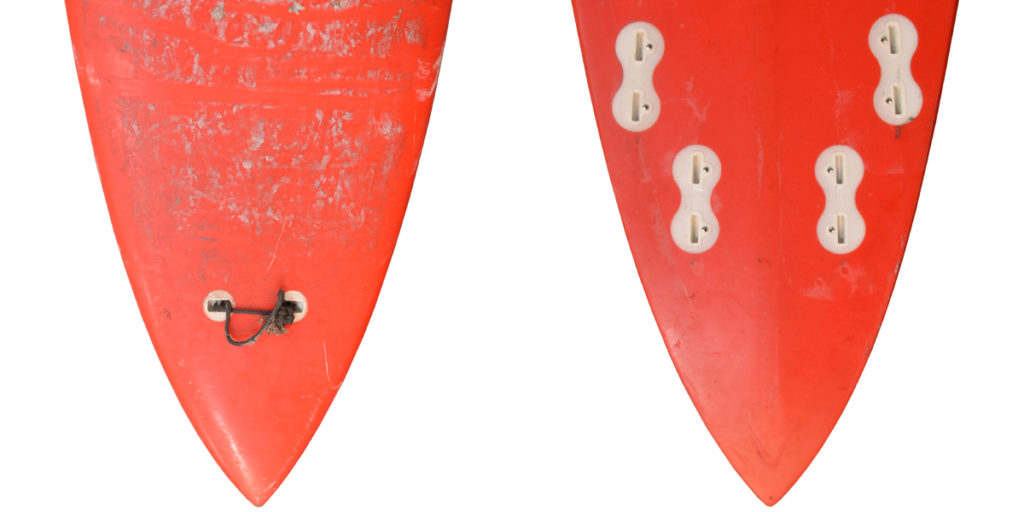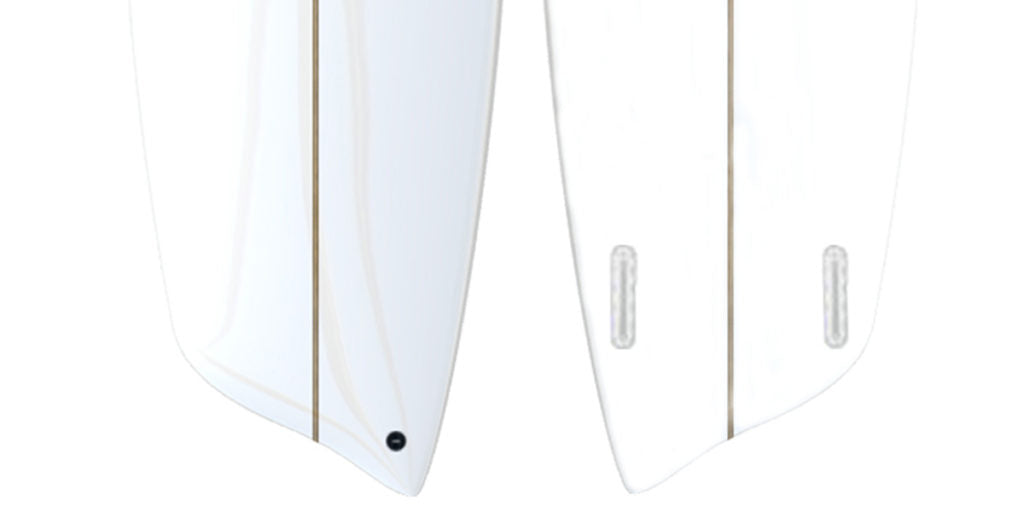



Posted on August 15, 2019 by Jeff Hale
It’s difficult to understate the impact that different surfboard tail shapes have on a board’s performance. While the variety of tail shapes may look purely aesthetic to the untrained eye, they’re one of the most impactful surfboard design elements.
The shape of your tail plays a huge role in how you turn, which impacts everything from maintaining speed to overall control and feel on a wave. While most tail shapes will work just fine in most conditions, matching the correct tail shape to the correct swell conditions is an easy way to take your surfing to the next level. Most beginners buying their first surfboard will want to stick with round and square tails that perform well in all conditions, but intermediate to experienced surfers can revel in the variety of surfboard designs offered by modern surfboard shapers when small or large waves call for something special. We're focusing the five basic surfboard tail shapes because these represent the foundation for countless surfboard tail shape variations.

The square or squash tail is easily the most popular tail design in today’s high-performance surfboards. Its two square (or slightly rounded) edges act as a pair of release points for the water flowing off the back of your board that allows for quick, sharp turns in small to medium surf. This instant maneuverability has made the squash tail the preferred design for the vast majority of professional surfers. In fact, when Olympic Surfing hits Tokyo in 2020, most boards in the competition will feature square or squash tails.
From classic longboards to modern shortboards, the square or squash tail is perfect for all-around performance on most waves.

Round tails have much less surface area than most of the other standard tail shapes. And with less material fighting against the water, it’s easier to force your board under the water to initiate a turn. Surfers will describe this ease of maneuverability as feeling “loose” in the water. Turns on surfboards with round tails are smooth and drawn out because the tail doesn’t have a sharp or abrupt release point for the water flowing off the board.
Round tails are great for holding long and smooth turns without losing speed, but they won’t help much with quick or sharp movements in the most critical section of a wave.

When dealing with smaller, gutless surf, fish or swallow tails are your best friend. The upside down “v” cut out from a square tail essentially creates a pair of pin tails that bite really well in and out of turns. The relatively wide outline helps users to generate high speeds through any mushy or slow sections of a wave. But they’re not just for small waves boards, either. The original purpose of this tail design was to shred in the hollow and large waves of South San Diego.

You can find fish tails on everything from hybrids and big guy shortboards to longboards. While they work very well in the smallest surf you can ride, they also have their place in bigger more powerful waves. Shop fish surfboards today!

Pin tail surfboards are typically only ridden on bigger waves. These tails create the most hold and speed, providing surfers with maximum control in powerful waves. However, the trade-off for increased hold is a lack of maneuverability. When you’re racing down the face of a 20-foot wave crashing over a shallow reef, holding your line is far more important than a quick turn.
Pin tails are perfect for setting a line and holding it at maximum speed in powerful surf, and that’s why they're the preferred tail design for step-up surfboards and big wave guns.

The asymmetric tail is one of the wilder designs you’ll ever come across, but it actually makes perfect sense. That’s because surfers aren’t able to turn the same on frontside vs. backside waves. A surfer’s toeside turn is smoother and more drawn out than the heelside turn, which is a result of the way we’re able to bend our bodies forward. A heelside turn is more abrupt and sharp because we have less control over our bodies when we lean backward.
These boards will usually feature a round tail for heelside turns and a much sharper square or even a fish tail for toeside turns. Once you realize that we approach waves differently depending on the direction we’re turning, you’ll wonder why more boards aren’t designed like this.
You have to be pretty connected to your board to appreciate the nuances between tail shapes. If you don’t have a consistent surfing stance and bottom turn, it will be difficult to notice a difference in the turning radius between a round and a square tail. But if you surf with any regularity, your board’s tail shape should match the surf conditions. Generally speaking, that means looking for wider tails for help with speed on a smaller wave and narrower tails for an easier transition from rail to rail for more aggressive turns in bigger waves.
Keep in mind that a surfboard tail shape is only one variable in a complex design equation. How your tail works with your rails, nose shape, fins, concave, and overall board shape will ultimately determine how your board performs. For an experienced surfer, variety is the spice of life. So get yourself a handful of surfboards in different lengths with different tail shapes to enjoy when the conditions call for something specialized.

Sign up for our newsletter
Get exclusive insider access to products and promotions
Copyright © 2024 Paddle Boards and Surfboards By ISLE Surf & SUP. All Rights Reserved